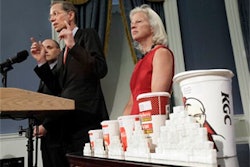NEW YORK (AP) — Disney says its programming will no longer be sponsored by junk food.
The Walt Disney Co. said Tuesday that it will become the first major media company in the U.S. to ban such ads for its TV channels, radio stations and websites intended for children.
The guidelines won't go into effect until 2015 because of existing advertising agreements.
First Lady Michelle Obama called the announcement a "game changer" in a statement.
"With this new initiative, Disney is doing what no major media company has ever done before in the U.S. — and what I hope every company will do going forward," Obama said.
Disney says its guidelines are aligned with federal standards to promote the consumption of fruits and vegetables and reduce the intake of sodium, sugar and saturated fat.
The kids' meals offered by traditional fast-food chains may not meet the new advertising guidelines, even if the meals come with healthy side orders, says Leslie Goodman, Disney's senior vice president of corporate citizenship. That's because Disney will be assessing the restaurant's broader offerings in deciding whether to approve ads.
The company will have to show it offers a broader menu of healthier options, she said.
For example, a complete meal under Disney's guidelines could have no more than 600 calories and a side dish no more than 200 calories.
Without naming specific companies, Goodman said there are ads currently running on Disney channels that would not meet the new standards.
Disney CEO Bob Iger said there might be a short-term reduction in advertising revenue, but that he hopes companies will eventually create products that meet the standards.
Public health and childhood obesity experts cautioned that the effectiveness of any ban will be in how junk food is defined by the company. Previous attempts by the food industry to regulate marketing to children have been criticized as being too generous in which products were allowed.
But Aviva Must, chairwoman of the Department of Public Health and Community Medicine at Tufts School of Medicine, said Disney could succeed where government thus far has made little progress.
"There seems to be limited taste for government regulation," said Must, who has studied childhood obesity for decades. "So I think a large company like Disney taking a stand and putting in a policy with teeth is a good step."
Margo Wootan, nutrition policy director at the Center for Science in the Public Interest, said she hopes Disney's decision triggers similar changes with other companies.
"Disney's announcement really puts a lot of pressure on Nickelodeon and Cartoon Network and other media to do the same," she said.






















